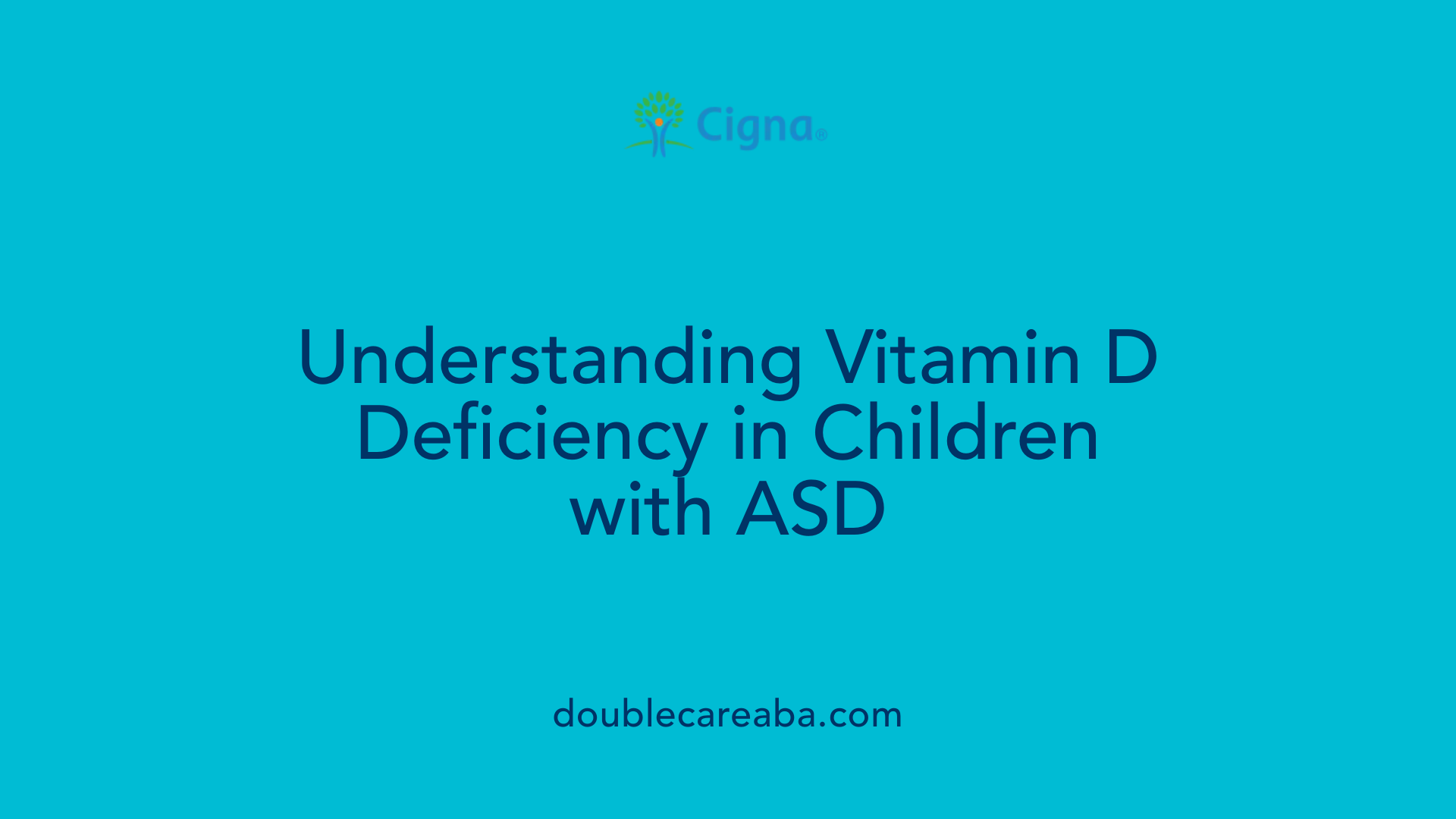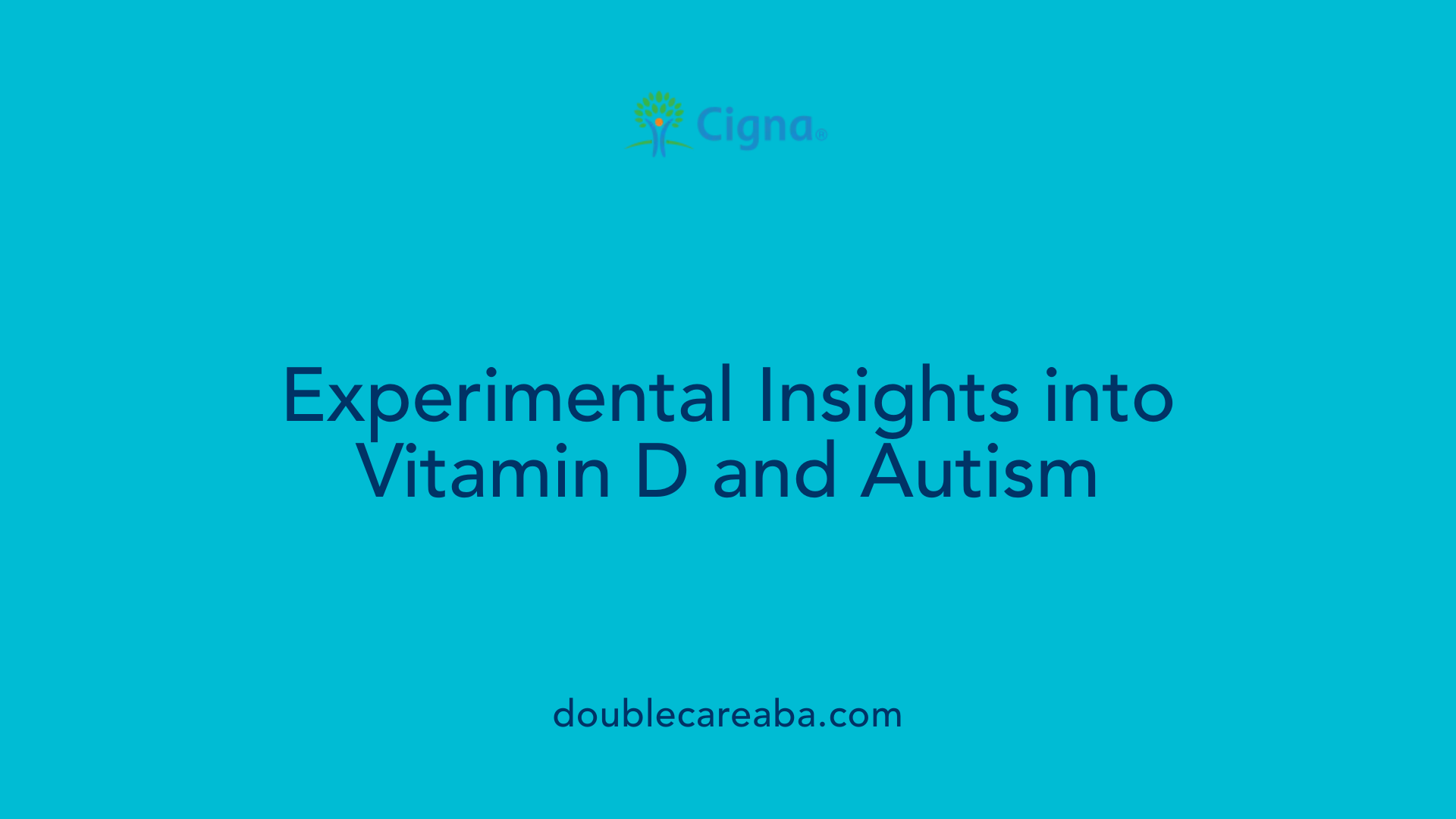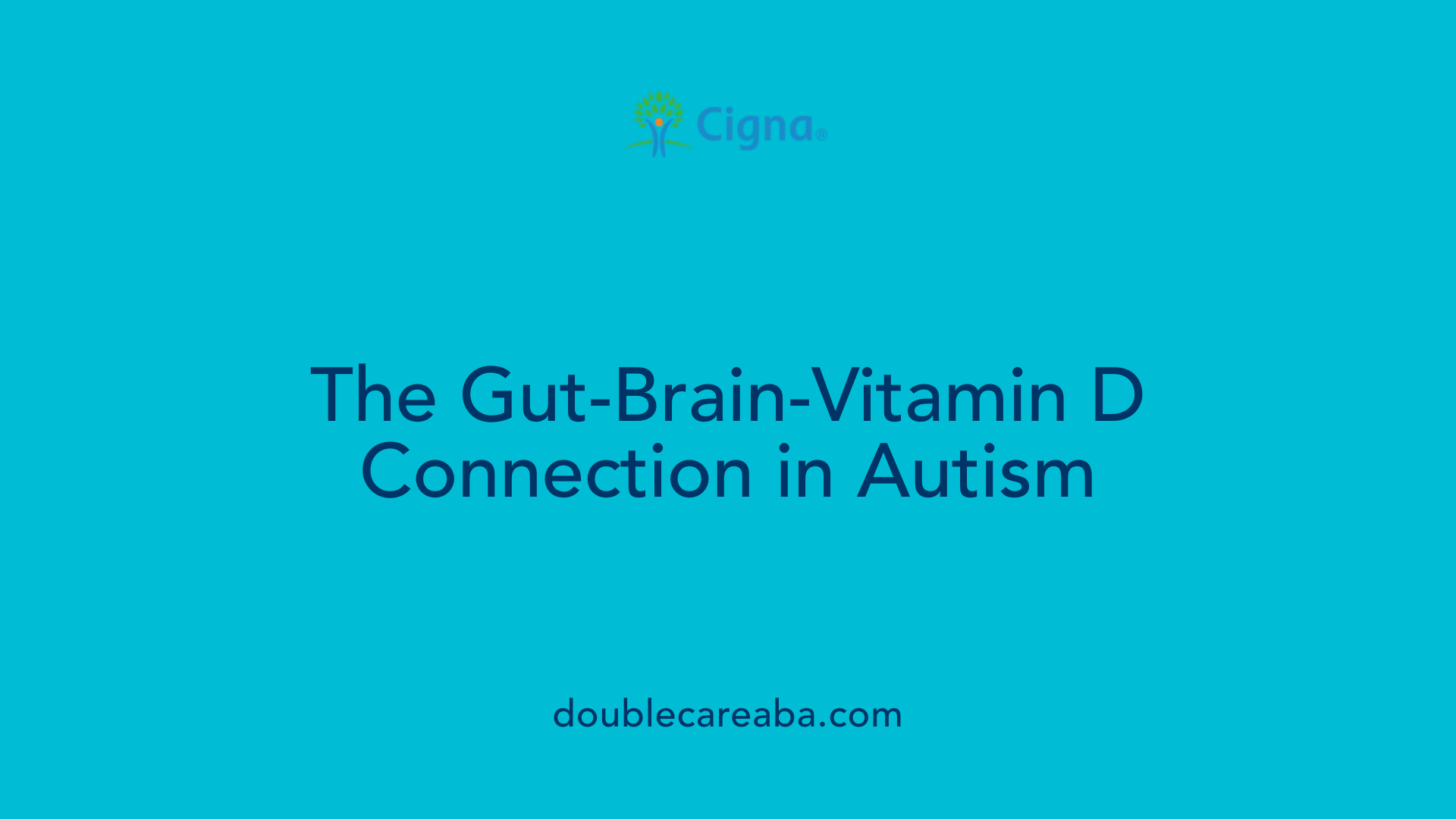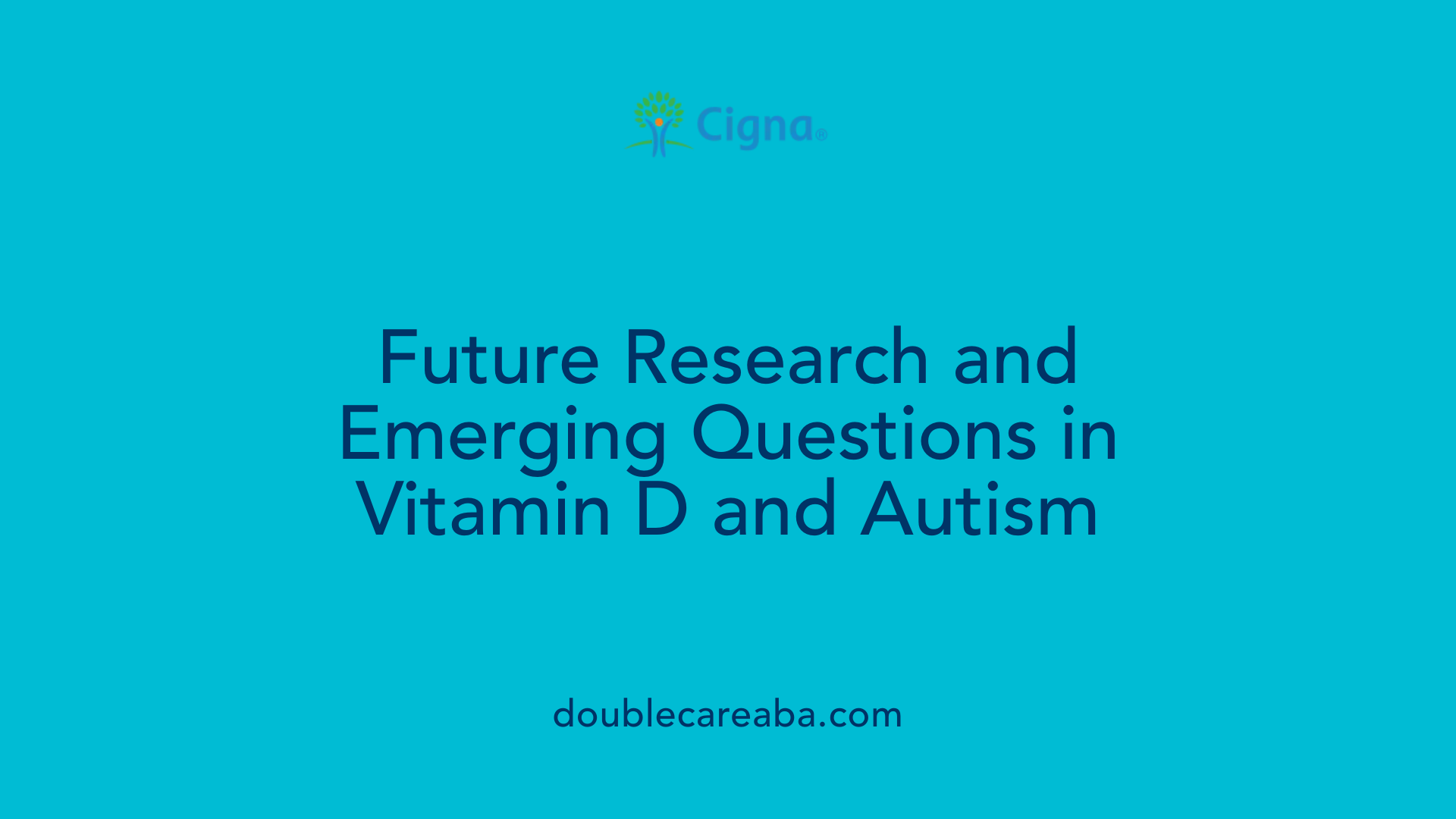Understanding the Connection Between Vitamin D and Autism
Recent research increasingly indicates a significant correlation between vitamin D levels and autism spectrum disorder (ASD). From fetal development to early childhood, vitamin D's influence extends across neurodevelopment, immune regulation, and behavioral health. This article explores the scientific evidence, biological mechanisms, and potential therapeutic implications of vitamin D in relation to ASD.
The Prevalence of Vitamin D Deficiency in Children with ASD

What are the research findings on vitamin D deficiency and its correlation with autism?
Research indicates that children with autism spectrum disorder (ASD) tend to have substantially lower levels of vitamin D compared to typically developing children. Numerous studies report a high prevalence of vitamin D deficiency and insufficiency among children with ASD, with deficiency rates observed to vary widely—from as low as 13% to as high as 100%. For instance, a study from Turkey found that about 95% of individuals with ASD had low vitamin D levels, with 13% experiencing severe deficiency.
Serum vitamin D levels are consistently lower in children diagnosed with ASD. This deficiency has been linked not only to the presence of autism but also appears to correlate with the severity of symptoms. Some observational studies have shown that children with more pronounced ASD symptoms tend to have lower vitamin D levels.
Maternal vitamin D status during pregnancy also plays a role. Deficiency in mothers has been associated with an increased risk of ASD in their children, emphasizing the importance of adequate vitamin D levels during gestation. Animal studies support this finding, demonstrating that vitamin D deficiency during pregnancy can cause overproliferation of neuronal cells and other brain developmental abnormalities linked to autism.
Additionally, vitamin D influences brain development and function through various mechanisms such as modulation of neurotransmitters like serotonin and GABA, regulation of neurotrophins, and anti-inflammatory effects. Because of these biological roles, low vitamin D levels are considered a potential environmental factor that increases ASD risk.
Some interventional research has explored whether supplementing vitamin D can improve symptoms of ASD. Preliminary findings suggest that vitamin D supplementation could lead to significant improvements in core autism behaviors, although results across studies have been inconsistent. Limitations such as small sample sizes and differing study methodologies mean more rigorous research is needed.
A comprehensive review of population data further supports the association between vitamin D deficiency and neurodevelopmental disorders. For example, a large cohort study by The University of Queensland involving over 71,000 individuals found that neonates with vitamin D deficiency had higher chances of developing mental health disorders, including autism, schizophrenia, and ADHD.
While more research is necessary to establish causality firmly, current evidence points to vitamin D deficiency as a significant and modifiable risk factor for ASD. Ensuring adequate vitamin D levels in pregnant women and young children could potentially serve as a preventive measure, and vitamin D supplementation might also help improve neurodevelopmental outcomes for children with ASD.
In summary, the research underscores the importance of monitoring and addressing vitamin D deficiency in early life. By doing so, there may be opportunities not only for reducing the risk of ASD but also for promoting better overall neurodevelopmental health in children.
Biological Mechanisms: How Vitamin D Impacts Neurodevelopment and ASD
Vitamin D influences various biological processes essential for brain development and immune regulation, which are pertinent to understanding its role in autism spectrum disorder (ASD). One critical aspect is its effect on gene expression; vitamin D receptors are present in brain neurons and glial cells, indicating that it can regulate genes involved in neuronal growth, differentiation, and synaptic plasticity. This regulation may impact neural circuit formation, which is often atypical in ASD.
In addition to gene regulation, vitamin D modulates neurotransmitter systems such as serotonin, dopamine, and gamma-aminobutyric acid (GABA). These neurotransmitters are central to mood, behavior, and social functioning—areas often affected in ASD. For instance, vitamin D influences serotonin synthesis and release, which plays a role in mood and social behavior. Alterations in dopamine and GABA systems have also been observed in autism, and vitamin D's modulation of these pathways could contribute to ASD symptoms.
Furthermore, vitamin D exerts immunomodulatory, anti-inflammatory, and antioxidative effects. In ASD, neuroinflammation and oxidative stress are common features, and vitamin D's capacity to reduce inflammation and neutralize reactive oxygen species makes it a vital player in maintaining neural health. Its anti-inflammatory properties may help prevent or mitigate immune dysregulation implicated in ASD.
Finally, growing evidence suggests that vitamin D affects the gut-brain axis via microbiome alterations. Animal studies have shown that vitamin D deficiency can lead to microbiome imbalance, gut inflammation, and increased intestinal permeability, all of which might influence neurodevelopment. Changes in gut bacteria such as Parabacteroides and Phascolarctobacterium have been linked to social behaviors relevant to autism.
While these mechanisms highlight how vitamin D might support neurodevelopment and influence ASD-related pathways, current evidence suggests that its role is more modulatory than causative. Studies, including Mendelian randomization analyses, indicate that low vitamin D levels may often be a consequence rather than a cause of ASD. Nonetheless, maintaining adequate vitamin D levels during pregnancy and early childhood remains a promising strategy for supporting healthy neurodevelopment.
The Impact of Pregnancy and Early Childhood Vitamin D Status on Autism Risk

Is there an association between vitamin D deficiency during pregnancy and autism risk in children?
Current research highlights a significant link between maternal vitamin D levels during pregnancy and the likelihood of autism spectrum disorder (ASD) in offspring. Multiple observational studies have demonstrated that women with vitamin D deficiency, especially during mid-gestation, tend to have a higher chance of giving birth to children with ASD.
Specifically, maternal vitamin D deficiency, defined as levels below approximately 30 nmol/L, has been associated with increased autism-related behaviors and traits in children. Studies from the Netherlands and Sweden support this, showing that lower vitamin D levels during pregnancy correlate with a higher incidence of autism symptoms.
These findings suggest that maintaining adequate maternal vitamin D—ideally through safe sun exposure, diet, or supplementation—could influence fetal brain development positively. Some research even finds that deficiency during the second trimester has a more pronounced effect on autism risk, emphasizing the importance of this specific period.
However, it is important to note that most of this evidence is observational and does not prove causality. Large-scale studies and genetic analyses, like Mendelian randomization, have yet to definitively establish that vitamin D deficiency directly causes autism. Nonetheless, given the potential neurodevelopmental impact, healthcare providers often recommend ensuring sufficient vitamin D intake during pregnancy.
In summary, current data suggest a noteworthy association between maternal vitamin D status and autism risk, supporting the idea that early intervention through vitamin D supplementation might help reduce the incidence of ASD. Nonetheless, further research is needed to clarify the exact causal mechanisms and optimal vitamin D levels for fetal neurodevelopment.
Animal and Human Studies: Experimental Evidence on Vitamin D and Autism

Does vitamin D supplementation improve symptoms or severity of ASD?
Research exploring the connection between vitamin D and autism spectrum disorder (ASD) suggests a promising but still developing picture. Multiple studies have consistently found that children with ASD often have lower vitamin D levels compared to typically developing peers. This deficiency correlates with increased severity of autism symptoms, including challenges in social interaction and increased stereotypical behaviors.
Experimental studies, including some clinical trials, have tested whether supplementing vitamin D can alleviate ASD symptoms. In animal models, specifically rats with induced vitamin D deficiency during development, researchers observed behavioral changes reminiscent of ASD, such as social impairments and repetitive behaviors. These models demonstrate that vitamin D deficiency can alter important neurodevelopmental processes, including gene expression, neuronal cell proliferation, and neurotransmitter modulation. Importantly, vitamin D supplementation in these animals has been shown to improve behaviors and brain anomalies.
In human clinical settings, several open-label trials and randomized controlled studies have been conducted. They generally report that vitamin D supplementation can significantly increase serum 25(OH)D levels in children with ASD. Notably, some studies have documented improvements in core symptoms, such as increased social responsiveness and reduced stereotypy, following treatment with doses up to 5000 IU/day. For example, children receiving vitamin D supplementation—a regimen reaching serum levels around 45-52 ng/ml—showed notable symptom improvements.
However, the evidence is mixed. Not all studies report statistically significant improvements, and variability in study design, sample sizes, dosing protocols, and duration limits definitive conclusions. Factors such as baseline vitamin D levels, age at intervention, genetic differences (like VDR gene polymorphisms), and timing during neurodevelopment influence outcomes.
Vitamin D supplementation appears to be safe and well-tolerated when monitored appropriately, with only rare cases of mild side effects reported. Nonetheless, large-scale, long-term randomized trials are needed to establish causality, optimal dosing, and the duration of treatment.
In summary, current data suggest that addressing vitamin D deficiency in children with ASD could improve some core symptoms, but more rigorous research is necessary to confirm these findings. Practitioners should consider vitamin D status as part of a comprehensive management plan for ASD and remain cautious, awaiting further definitive evidence.
Gut Microbiome, Vitamin D, and Autism: A Complex Interplay

How are gut microbiota altered in children with ASD?
Research shows significant differences in the gut microbiome of children with autism compared to neurotypical peers. Some studies report that children with ASD have higher levels of certain bacteria like Phascolarctobacterium and Parabacteroides, which are associated with autism-related social behaviors. Additionally, gut health issues such as decreased villi length and increased levels of the metabolite propionate have been observed, potentially impacting brain function and behavior.
What impact does vitamin D deficiency have on gut health?
Vitamin D is essential for maintaining gut integrity and microbiome stability. Deficiency in vitamin D can lead to dysbiosis, which affects the gut’s barrier function and promotes inflammation. Animal studies have indicated that vitamin D deficiency results in microbiome alterations, including increased harmful bacteria and decreased beneficial species. These changes can compromise gut health, leading to increased permeability and elevated inflammatory responses that may influence neurodevelopment.
What do microbiome studies in animal models reveal about ASD?
Animal models provide valuable insights into the gut-brain axis in ASD. In rodent studies, vitamin D deficiency during development has been linked to behaviors like social impairments and stereotyped activities. These models also exhibit gut microbiome alterations, with increases in bacteria associated with autism-like symptoms. Supplementing vitamin D in such models has shown potential in reversing some behavioral and gut health abnormalities, suggesting that restoring vitamin D levels could mitigate autism-related traits.
How are gut bacteria connected to autism-related behaviors?
Research indicates that specific gut bacteria correlate with autism symptoms. For example, higher levels of certain bacteria like Parabacteroides have been associated with increased social deficits. Changes in gut microbiota can influence neurodevelopment through metabolic products, immune modulation, and the gut-brain axis. Elevated propionate levels, linked to gut microbiome alterations in vitamin D deficiency, are known to impair neuronal signaling and promote behaviors characteristic of ASD.
Scientific hypotheses and experimental data on vitamin D’s role
Emerging evidence suggests that vitamin D influences neurodevelopment by modulating inflammatory responses, neurotrophin production, and neurotransmitter regulation, including serotonin and dopamine. During critical periods of brain development, vitamin D deficiency can lead to exaggerated neuronal proliferation and altered gene expression related to brain structure and function. Animal studies have demonstrated that vitamin D deficiency causes structural brain abnormalities, hyperlocomotion, and behavioral deficits akin to autism.
Specifically, research shows that developmental vitamin D deficiency can increase fetal testosterone levels, which is hypothesized to be a biological factor in ASD etiology. In rodent models, prenatal vitamin D supplementation prevented ASD-like traits in offspring, reinforcing the notion that vitamin D is vital for healthy neurodevelopment.
Furthermore, vitamin D’s immune-modulating and antioxidative properties may influence gut health and neuroinflammation, two critical factors in ASD pathology. The pathways involve vitamin D’s regulation of gut microbiota composition, intestinal barrier integrity, and inflammatory cytokines.
Concluding insights
The scientific data point toward a complex interaction where vitamin D deficiency impacts both gut microbiota and brain development. While current studies are promising, most are observational, and causality has yet to be firmly established. Nonetheless, maintaining adequate vitamin D levels through supplementation during pregnancy and early childhood appears to be a promising avenue to reduce autism risk and improve symptoms potentially linked to gut health and neurodevelopment.
Future Directions and Research Gaps in Vitamin D and Autism

What are the ongoing scientific questions and future research directions about vitamin D and autism?
While accumulating evidence suggests that vitamin D deficiency during pregnancy and early childhood might increase the risk of developing autism spectrum disorder (ASD), and that supplementation can potentially improve some symptoms, there remain many unanswered questions. One major area of interest is understanding exactly how vitamin D influences neurodevelopment at the biological level. Researchers are investigating pathways involving neurotrophic factors, neurotransmitter regulation, gene expression, and immune modulation.
However, establishing causality remains challenging. Many studies show associations, but some genome-wide analyses and Mendelian randomization studies suggest that ASD may cause lower vitamin D levels rather than the other way around. This makes it difficult to definitively claim that supplementation prevents ASD.
Future research should prioritize well-designed, high-quality randomized controlled trials (RCTs). These trials need to carefully determine the optimal dose, timing, and duration of vitamin D supplementation, particularly in vulnerable populations such as pregnant women, fetuses, and young children at high risk of ASD. Understanding whether early intervention yields better outcomes is crucial.
In addition, exploring genetic factors like polymorphisms in vitamin D receptor (VDR) genes may help identify who benefits most from supplementation. Advanced molecular studies in animal models and human biomarker research will be vital in uncovering the neurobiological mechanisms by which vitamin D influences brain development.
Overall, the knowledge gaps in this field highlight the need for interdisciplinary research combining epidemiology, genetics, neurobiology, and clinical trials to harness vitamin D’s potential in ASD prevention and management.
Concluding Perspectives on Vitamin D and Autism
While current evidence links vitamin D deficiency to increased autism risk and symptom severity, the data remain predominantly observational. Animal studies and small clinical trials suggest potential benefits of supplementation, but causality has yet to be firmly established. Advancing our understanding through rigorous research, including high-quality randomized controlled trials and mechanistic studies, is vital for determining whether vitamin D can be an effective preventive or therapeutic tool for ASD. Meanwhile, ensuring adequate vitamin D levels in pregnant women and young children remains a prudent health strategy, given its broad role in neurodevelopment, immune function, and overall well-being.
References
- The Role of Vitamin D Supplementation in Children with ...
- Research Progress on the Role of Vitamin D in Autism ...
- Associations between vitamin D and core symptoms in ASD
- Vitamin D the clue to more autism spectrum disorder in boys
- More findings point to high rate of vitamin D deficiency in ...
- Developmental vitamin D-deficiency produces autism ...
- Vitamin D and autism, what's new?
- Newborn vitamin D deficiency linked to higher risk ...
- Autism and vitamin D
- Vitamin D profile in autism spectrum disorder children and its ...













